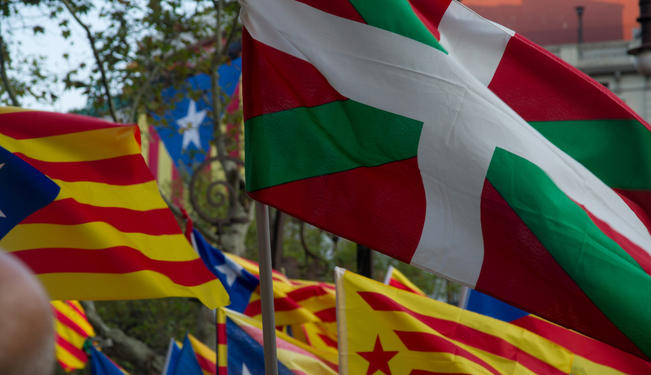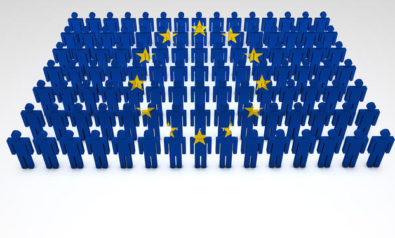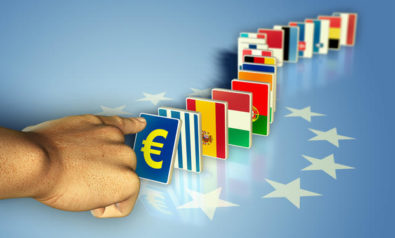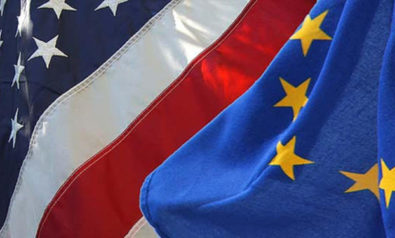As recent elections bring pro-independence parties into power, Ryan Barnes takes a look back at the history of Basque and Catalan nationalist aspirations.
The Crisis of National Identity
The nature of European nationalism, in many ways, has changed. While the nationalism that underlined two world wars has largely subsided, notably spurred on by European Union integration, a modified form is still alive and well in Europe. However, rather than German or Italian, modern day nationalism is more likely to be intrastate, found in Scotland or Flanders. Some of these groups’ nationalist demands date back centuries, but now the issue of sub-nationalism is commonplace, and the central governments of many multi-ethnic states must determine how to manage these nationalist demands.
Spain is one such state confronted with the issue of sub-nationalism. The southern European country is unique, however, in that it is home to not just one, but many nationalist movements on its periphery. The Basques and Catalans, who trace their nationalist histories back centuries, are the two foremost and empowered ethnic groups attempting to wrest power away from the central government in Madrid. While the two share many common traits, they also diverge in certain aspects and platforms of their movements.
Both Basques and Catalans have maintained linguistic, cultural, and economic differences with the rest of Spain. Both enjoyed trappings of autonomy – fueros – or charters, which exempted them from some taxes and military service requirements over the years. And they have both seen crackdowns by the central government, first by Primo de Rivera in the 1930s and then Francisco Franco, who suppressed the use of regional language or any outward display of sub-nationalism during his nearly forty-year rule.
The modern form of Basque and Catalan nationalism arose roughly at the same time, as nationalism was spreading across nineteenth-century Europe. Rapid industrialization, which resulted in massive social change and urban migration, whereby floods of people left their rural homes for the big city, led to a questioning of one’s identity. Basques and Catalans, like others in Europe, were suffering from this identity crisis, looking for an entrenched uniqueness in the midst of large-scale social change, which they found in romantic nationalism. The Spanish state was in decline at this point, having lost its former empire, which allowed for peripheral nationalism to flourish.
Both modern movements were also formed and cultivated by prominent nationalist leaders. For Basques, Sabino Arana is the godfather of nationalism. He espoused the Basque language, formed the Basque Nationalist Party in 1895, wrote the national anthem, and designed the flag. Arana’s Catalan counterpart, Valenti Almirall, was not as famous or unaided in his nationalist pursuit, but was an essential leader of the movement. Almirall published El Estado Catalan, a Federalist paper in 1870, which led to the formation of patriotic association Jove Catalonia (Young Catalonia). “Lo Catalanisme”, Almirall’s nationalist manifesto, then surfaced in 1886.
A Story of Two Nationalisms
This is where the similarities end. Modern Basque and Catalan nationalisms differed in their central tenets, tactics, and goals. While Arana promoted a more primordial, racial, and thus exclusionary form of Basque nationalism, Almirall and the Catalans were more civic-minded and tolerant of outsiders who came to Catalonia and assimilated.
Language was primarily used to promulgate these divergent methods. The Basque language is an oddity. It is one of the few pre-Indo-European languages – it has no apparent relative and is thus very difficult to learn. This was all well and good for Basque nationalists, who used it to distinguish themselves from Spanish immigrants. But Arana viewed race as a better means of exclusion because of its primordial or unchangeable nature – a contrast to the fungibility of language. As Arana put it, “So long as there is a good grammar and a good dictionary, language can be restored even though no one speaks it. Race, once lost, cannot be resuscitated.”
Catalan, on the other hand, is a romance language similar to Spanish, making it easier to learn, especially for Spanish-speakers. Catalan nationalist founders valued language above most other traits, including race. Prat de la Riba, who founded the Lliga de Catalunya in the late 1880s, defined the nation as “a society of people who speak a language of their own and have the same spirit that manifests itself or is characteristic for the whole variety of the whole collective life.” For the most part, as long as one learned Catalan and adhered to the culture, one could be considered Catalan.
These divergent roots partially manifest themselves in another difference between the two: why Basque nationalists have, by and large, been more separatist and extremist than Catalans. Basque nationalism has wielded a terrorist group, Euskadi Ta Askatasuna (Basque Fatherland & Freedom; ETA), which has been known to utilize violence in a quest for outright secession, claiming over eight hundred victims since its inception in 1959. Notwithstanding violent Catalan group Terra Lliure’s brief campaign that spiked in the 1980s and resulted in one fatality, Catalan nationalism has been largely marked by peaceful calls for greater autonomy.
Despite maintaining core identities, Basque and Catalan nationalism has changed over the years, particularly in the latter half of the twentieth century. In the Basque Country, ETA eschewed the staunch Catholicism of Arana and added a Marxist bent, calling for the establishment of an independent, Marxist Basque state. Mainstream Basque nationalism – that espoused by the region’s longtime political heavyweight, the Basque Nationalist Party (PNV) – has also evolved from Arana’s heavy emphasis on primordial ties, allowing for a more civic notion of Basque nationalism. PNV has been fairly content with Basque autonomy and has at times appeared indifferent to full independence, focusing instead on negotiation with the Spanish state for more privileges.
Since the onset of democracy and federalism in Spain, which resulted in a system where seventeen “autonomous zones” share powers with Madrid, both regions have obtained vast control over their own affairs, particularly in the areas of health, policing, and education. The Basque Country and the neighboring region of Navarra, however, enjoy slightly greater fiscal than Catalonia as they maintain, regulate, and collect their own taxes.
While many were placated by these newfound powers, pro-independence Basque and Catalan groups continued to maintain a presence in the political realm. Despite increased self-rule, Basque terrorist group ETA renewed its bloody campaign in the 1980s, killing over ninety people in 1980 alone. While Catalans were largely content with greater autonomy, leftist party Republican Left of Catalonia (ERC) kept up its fight for full sovereignty. But Catalan separatists were in the minority, and Basques, again, were more supportive of secession than their Catalan counterparts. In 2006, before the financial crisis gripped Spain, separate polls showed roughly thirty-two percent of the Basque populace favored independence, while only fourteen percent of Catalans expressed desire for an independent state.
The situation is now more fluid. In Catalonia, recent economic turmoil has stoked nationalist fervor; a September 2012 poll registered pro-independence sentiment at nearly fifty-five percent.The Basque Country’s circumstances have also been altered in the last few years, notably by the downfall of ETA. A loss of popular support for the terrorist group, combined with a concerted police enforcement effort and bipartisan political pressure, resulted in a permanent ceasefire announced in January 2011 and a call for talks with the Spanish government (Madrid has initially balked at negotiating with a terrorist group) that would likely lead to its complete disbanding. And this has coincided with a boost in the political fortunes of former ETA operatives and supporters. Euskal Herria Bildu (Basque Country Gather), a leftist party formed after ETA’s ceasefire pledge and composed of former ETA supporters and longtime non-violent advocates for Basque independence, is becoming a political force.
An Enemy in Madrid?
Both regions recently held elections – in the Basque Country in October 2012 and in Catalonia the following month – in which those advocating for secession fared very well. The Basque Country poll resulted in a victory for the moderate center-right PNV, which garnered twenty-seven of the regional parliament’s seventy-five seats. But EH Bildu came in a close second, winning twenty-one seats – quite a feat for a party composed of members previously banned from politics altogether. It was somewhat similar in Catalonia in that Convergence and Union (CiU), the historically more moderate and dominant force, lost votes but took first place, edging out radical leftist and pro-independence party, ERC. Together, separatist parties – CiU, ERC, the environmentalist Initiative for Catalonia Greens (ICV) party, and new secessionist party Popular Unity Candidates (CUP) – won a near two-thirds majority of eighty-seven seats.
Separatist parties in both regions now have the opportunity to take the initiative as a result of the elections. But it is not that straightforward. While the main winners in Catalonia, CiU and ERC, both campaigned on conducting a referendum on independence in the near future, they are strange bedfellows. Center-right and erstwhile supporter of autonomy within Spain, CiU, did not receive the mandate it desired, and the more radical, leftist ERC is against CiU’s austere economic platform. While this does not bode well for the stability of the coalition recently formed between the two, they have announced the intention to hold a referendum on independence in 2014.
The independence drive will be even trickier in the Basque Country, where PNV and EH Bildu, across the political spectrum, will also find it difficult to work together. PNV has formed a single-party government, although it has held out the option of potentially forming a coalition government in the future. Moreover, separatist sentiment is now less audible in the Basque Country than in Catalonia – a historic change of events – in part because the region already possesses the fiscal sovereignty Catalonia craves and also has lower unemployment levels, making the cause for independence a little cloudier.
Regardless of the internal conflicts, both separatist movements will find an enemy in Madrid, adamantly opposed to granting independence. The Spanish Constitution forbids separation and referendums on the subject. Regional independence would need to be approved by the state and all Spaniards. Catalonia or the Basque Country would have to seek support on the European level. Prime Minister Mariano Rajoy is seemingly unwavering in his support for a united Spain, making it difficult to imagine the dissolution of Spain, at least in the near future.
The more likely outcome is continuation of the status quo, or minor changes in the statute of autonomy, in the Basque Country. The separatist mood is less fervent and tangible, largely because the region maintains so much self-rule already. But the situation in Catalonia has the potential to inflame the secessionist movement in the Basque Country; if Catalans set the precedent and are in reach of gaining independence, the Basque Country would almost certainly feel the need to follow suit.
Meanwhile, the new Catalan government, headed by CiU leader Artur Mas, will have to at least vocally support a referendum, which it has done already, and look as if it is trying to fulfill election pledges. But the real aim may be fiscal sovereignty. Indeed, a face-saving compromise between Rajoy and Mas would take the form of Catalonia gaining control over its taxes. It would help alleviate Catalan concerns that it allocates much-needed funds to other regions in Spain, and it would prevent a blatant step toward independence on Rajoy’s watch. But these issues can evoke such emotion and passion on all sides that make compromise nearly impossible. While the nationalist movements continue to evolve, they could be on an unavoidable collision course with Madrid.
Copyright © Shutterstock. All Rights Reserved.
The views expressed in this article are the author's own and do not necessarily reflect Fair Observer’s editorial policy.
Support Fair Observer
We rely on your support for our independence, diversity and quality.
For more than 10 years, Fair Observer has been free, fair and independent. No billionaire owns us, no advertisers control us. We are a reader-supported nonprofit. Unlike many other publications, we keep our content free for readers regardless of where they live or whether they can afford to pay. We have no paywalls and no ads.
In the post-truth era of fake news, echo chambers and filter bubbles, we publish a plurality of perspectives from around the world. Anyone can publish with us, but everyone goes through a rigorous editorial process. So, you get fact-checked, well-reasoned content instead of noise.
We publish 2,500+ voices from 90+ countries. We also conduct education and training programs
on subjects ranging from digital media and journalism to writing and critical thinking. This
doesn’t come cheap. Servers, editors, trainers and web developers cost
money.
Please consider supporting us on a regular basis as a recurring donor or a
sustaining member.
Will you support FO’s journalism?
We rely on your support for our independence, diversity and quality.













Comment